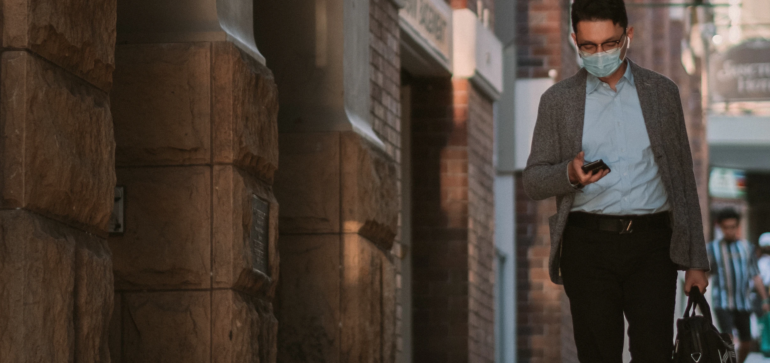
What’s the Best Way to Open the Country Again Per Jewish Ethics?
Dear JITC-
As the world considers opening back up again in the middle of a pandemic to stave off economic doom and mental health and domestic violence deaths, is there any wisdom we can turn to in Jewish ethics to decide what’s the least bad way to proceed?
Best,
J.W.
Dear J.W.-
The situation you describe is similar to the famous “trolley problem,” a philosophical no-win scenario posed in its modern form by Philippa Foot in 1967. (It had historical precedents.) The current form of the dilemma is as follows:
You’re standing near the switch that controls some train tracks while a runaway trolley is heading towards five people who are tied to the tracks. You can pull the lever, which will redirect the trolley onto another track, where there’s only one person bound to the track. Your options are to do nothing and five people die, or to pull the lever and only one person dies.
The consequentialist school of thought would favor pulling the lever, positing that the best course of action is the one that yields the greatest good, in this case a minimum loss of life. The deontological school of thought, however, would have you refrain from pulling the lever on the basis that one’s actions are inherently ethical or unethical regardless of their outcome.
Judaism does indeed have similar dilemmas and I’d have to say that our approach more closely approximates the deontological approach.
There’s a well-known Talmudic dictum that if someone tells you to kill a third party or that he will kill you, you have to give up your own life rather than murder the third party (Pesachim 25b). This is true even if sacrificing one innocent person’s life can potentially save many people. The Talmud Yerushalmi (Terumos 8:4) discusses a situation in which a group of travelers is confronted by a gang of brigands. The criminals say, “Give us one of your group to kill or we’ll kill all of you.” They may not throw an innocent person to the metaphorical wolves even if it means that they’ll all be killed.
(This is different from the case of Sheva ben Bichri in II Samuel 20. Sheva ben Bichri instigated a revolt against King David so the army tracked him down. They were prepared to destroy the city that was giving him refuge, so the residents gave him up. That case has two important differences: (1) the army was demanding Sheva; the people didn’t have to choose a victim and (2) Sheva was actually guilty of a capital offense.)
Now, you might think that saving life takes priority over absolutely everything. Usually, it does. We don’t hesitate to eat non-kosher foods, to drive on Shabbos or to eat on Yom Kippur if necessary to save a life but there are exceptions. Consider, if you will, the case described in Sanhedrin 75a. A certain man was so overcome with lust for a certain woman that he became seriously ill. His doctors said that he would die if he didn’t have sex with that woman. They asked the rabbis, who said that he should die rather than let her have relations with him. The doctors said that she should at least let him see her naked and the rabbis replied that he should die rather than let him see her naked. Finally, the doctors said that at the very least he should be permitted to talk to her in private from behind a fence in order to derive some small pleasure from her. The rabbis replied that he should die rather than let her talk to him from behind a fence.
You’ll note that this fellow’s health is not a reason this woman has to allow herself to be treated like a prostitute. You’ll also notice that his situation changed quite a bit. There’s a long way from “he’ll die if he doesn’t sleep with her” to “let him talk to her from behind a fence.” Perhaps he wasn’t in as imminent danger as they first said! They appear to have overstated the danger in the hopes of justifying the action they wanted to take.
There’s also a difference between taking action and remaining passive, a point that is made in several different contexts throughout the Talmud (Eiruvin 100a, et al.). Tosfos on Sanhedrin 74b (s.v. v’ha Esther) apply this to our case in which one must allow himself to be killed rather than kill another. That, they tell us, is only the case when one is forced to take action. But what about acting passively? For example, let’s say that a thug threatens to kill a person if he doesn’t allow that criminal to pick him up and throw him on top of an infant. That may be terrible but one need not sacrifice his life rather than comply because it entails no action on his part. When coerced to do something actively, the logic is “who says that your life is more important than the other guy’s?” When coerced to do something passively, the logic is “who says that the other guy’s life is more important than yours?”
Finally, there’s the question of how much danger one must assume in order to save others. If another person is drowning, I don’t have to save him if it means that I’ll certainly drown doing so. But what if the odds are 4 to 1 that I’ll drown? What about 10 to 1? What about 100 to 1? What’s the point at which I’m obligated to take a risk in order to save another? The Mishnah Brurah (329:19) rules that, while we need not endanger our own lives to save others, we must also be careful to make honest evaluations and not skew the results to get ourselves off the hook. (Leviticus 19:16 says, “Do not stand by when another is endangered; I am Hashem.” Why does the verse conclude “I am Hashem?” Because if we claim to have refrained due to personal danger, He knows whether or not such was truly the case.)
There is a certain logic in getting back to work because the collapse of the global economy affects everyone. As Spock puts it in the Star Trek franchise, “The needs of the many outweigh the needs of the few.” But when I see protestors holding signs saying, “Let the weak die,” it disgusts me. Such signs make it clear that their motivations are selfish and reprehensible, not a difficult choice between two no-win scenarios. Those are people who are not objectively evaluating the situation. If they don’t get their way, they’ll say, “At least let us talk to her from behind a fence.”
Ruling on this issue is far above my paygrade but it seems to me that the proper course of action is to continue the quarantine until it’s medically justifiable to go out. The certain threat of death to the elderly and immunocompromised trumps the financial impact and potential threats to others. (And let’s be honest, even young and healthy people can and have died from COVID-19, so there’s a potential threat to everyone’s life!) But most of all, we don’t save ourselves by throwing others under the bus – or in this case, the trolley.
Sincerely,
Sincerely,
Rabbi Jack Abramowitz
Educational Correspondent
Follow Ask Rabbi Jack on YouTube
If you found this content meaningful and want to help further our mission through our Keter, Makom, and Tikun branches, please consider becoming a Change Maker today.







